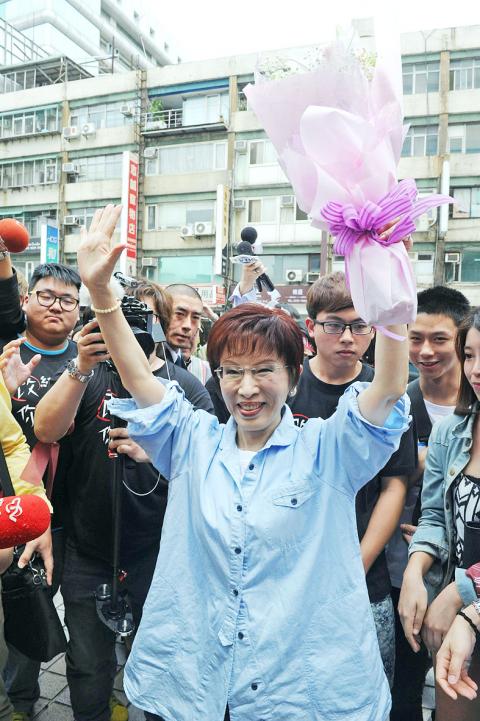Deputy Legislative Speaker Hung Hsiu-chu (洪秀柱) yesterday signed up to participate in the Chinese Nationalist Party’s (KMT) primary for its presidential candidate, becoming the first person to do so after the nomination process began.
More than 100 of Hung’s supporters gathered outside the KMT’s headquarters as Hung went through the process of acquiring an application form.
“Give me Hung Hsiu-chiu, pillar of tomorrow,” chanted her supporters. The word “pillar” is an allusion to the last character of her name in Chinese.

Photo: CNA
Addressing the crowd, Hung said that the battle had begun.
“Changes start today,” she said. “I would have every bone in my body smashed in exchange for the nation walking on the right path.”
She also pledged to take part in the primary, which she described as a fair and open election process under a democratic mechanism.
“Without this process, there will only be closed-door negotiations,” which Hung said she would never accept.
Hung is the only KMT member so far to come forward, while other hopefuls, including Vice President Wu Den-yih (吳敦義) and Legislative Speaker Wang Jin-pyng (王金平) have remained tight-lipped about their intentions.
Asked if he would also be taking an application form, Wang yesterday said: “I don’t know now ... later,” while giving his support to Hung.
New Taipei City Mayor and KMT Chairman Eric Chu (朱立倫) — who is widely seen as the KMT’s best chance of winning the presidential election next year — has made it clear on several occasions that he has no plans to enter the race.
Some KMT supporters remain hopeful that Chu might change his mind if enough people come forward to persuade him to run for the presidency.
The KMT started the nomination process to select a presidential candidate yesterday. Interested party members need to submit an application form and collect supporting signatures from 5 percent of KMT members to register as a candidate.
The hopefuls have 27 days to complete the process, with candidate registrations taking place on May 17 and May 18.
The candidate is to be selected by a combination of opinion polls and a vote by party members. The average from two polls is to account for 70 percent of the final result and the party members’ vote, to be held on June 14, would make up the remaining 30 percent.
The KMT has more than 300,000 members, so potential candidates need to collect 15,000 signatures each to reach the next stage of the selection process.
The KMT is to nominate its presidential candidate at a party convention in mid-July.
The Democratic Progressive Party on Wednesday last week nominated Chairperson Tsai Ing-wen (蔡英文) as its presidential candidate.
The Central Election Commission last month selected Jan. 16 next year as the date for the presidential and legislative elections.

Tropical Storm Gaemi strengthened into a typhoon at 2pm yesterday, and could make landfall in Yilan County tomorrow, the Central Weather Administration (CWA) said yesterday. The agency was scheduled to issue a sea warning at 11:30pm yesterday, and could issue a land warning later today. Gaemi was moving north-northwest at 4kph, carrying maximum sustained winds near its center of up to 118.8kph and gusts of 154.8kph. The circumference is forecast to reach eastern Taiwan tomorrow morning, with the center making landfall in Yilan County later that night before departing from the north coast, CWA weather forecaster Kuan Shin-ping (官欣平) said yesterday. Uncertainty remains and

SEA WARNING LIKELY: The storm, named Gaemi, could become a moderate typhoon on Wednesday or Thursday, with the Taipei City Government preparing for flooding A tropical depression east of the Philippines developed into a tropical storm named Gaemi at 2pm yesterday, and was moving toward eastern Taiwan, the Central Weather Administration (CWA) said. Gaemi could begin to affect Taiwan proper on Tuesday, lasting until Friday, and could develop into a moderate typhoon on Wednesday or Thursday, it said. A sea warning for Gaemi could be issued as early as Tuesday morning, it added. Gaemi, the third tropical storm in the Pacific Ocean this typhoon season, is projected to begin moving northwest today, and be closest to Taiwan on Wednesday or Thursday, the agency said. Today, there would likely

DISRUPTIONS: The high-speed rail is to operate as normal, while several airlines either canceled flights or announced early departures or late arrivals Schools and offices in 15 cities and counties are to be closed today due to Typhoon Gaemi, local governments announced last night. The 15 are: Taipei, New Taipei City, Taoyuan, Tainan, Keelung, Hsinchu and Kaohsiung, as well as Yilan, Hualien, Hsinchu, Miaoli, Chiayi, Pingtung, Penghu and Lienchiang counties. People should brace for torrential rainfall brought by the storm, with its center forecast to make landfall on the east coast between tonight and tomorrow morning, the Central Weather Administration (CWA) said. The agency issued a sea warning for the typhoon at 11:30pm on Monday, followed by a land warning at 11:30am yesterday. As of

CASUALTY: A 70-year-old woman was killed by a falling tree in Kaohsiung as the premier warned all government agencies to remain on high alert for the next 24 hours Schools and offices nationwide are to be closed for a second day today as Typhoon Gaemi crosses over the nation, bringing torrential rain and whipping winds. Gaemi was forecast to make landfall late last night. From Tuesday night, its outer band brought substantial rainfall and strong winds to the nation. As of 6:15pm last night, the typhoon’s center was 20km southeast of Hualien County, Central Weather Administration (CWA) data showed. It was moving at 19kph and had a radius of 250km. As of 3pm yesterday, one woman had died, while 58 people were injured, the Central Emergency Operation Center said. The 70-year-old